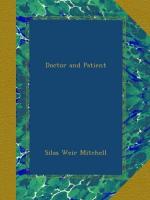The question of the truthfulness of physicians is one often raised. It troubles the consultant far more than it does the family doctor, and perhaps few who are not of us understand our difficulties in this direction. Every patient has his or her standard of truth, and by it is apt to try the perplexed physician. Some of the cases which arise are curiously interesting, and perhaps nowhere better than in the physician’s office or at the bedside do we see sharply developed the peculiarities of character as to this matter of truth in many of its aspects. There is the patient who asks you to tell him the whole truth as to his case. Does he really want to know? Very often he does not. If you tell him, you sentence him. You do not shorten his life, you only add to its misery. Or perhaps his wife has written to you, “On no account tell my husband that he cannot get well. He dwells now on every sign of failing health, and you will make him wretched.” You parry his question and try to help him. If he is resolute, he returns on you with a query so positive that you must answer frankly. His wife was right. You have done him an injury. There is the other man who insists at the start that you must on no account tell him if he cannot get well. You inform some relative of his condition. But perhaps he ought to know. He contemplates some work or travel which he should not undertake. You say so, and he replies, “But you have not told me that I am seriously ill.” Such is sick human nature.
The people who really want to know if they will die of some given disease are few in number. Those who pretend they want to know are more common. Those who should not know are frequent enough, and among them one is troubled to do what seems right and to say in answer to their questions what is true.
Wise women choose their doctors and trust them. The wisest ask the fewest questions. The terrible patients are nervous women with long memories, who question much where answers are difficult, and who put together one’s answers from time to time and torment themselves and the physician with the apparent inconsistencies they detect. Another form of trouble arises with the woman whose standards are of unearthly altitude. This is the woman who thinks herself deceived if she does not know what you are giving her, or who, if without telling her you substitute an innocent drug for a hurtful one which she may have learned to take too largely, thinks that you are untruthful in the use of such a method. And you would indeed be wrong if you were of opinion that to tell her the whole truth, and invite her to break the habit by her own act, were available means. I certainly do not think that you have any right (indeed, I would not even discuss this) to take active means to make her think she is taking, say opium, when you are only giving her something which tastes like it. If she asks, you must answer. But she may not, or does not, and yet when she is well again and learns




